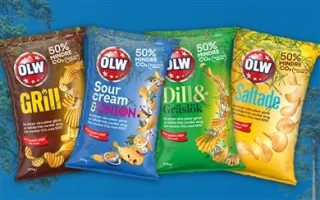Chemical industry company SABIC today announced that Orkla, Nordic brand owner in business-to-consumer (B2C) commerce with foods, snacks, food care for sport and food ingredients, has launched its first chips packaging using renewable polypropylene (PP) polymer from SABIC’s TRUCIRCLE™ portfolio. The sustainable material is derived from tall oil, a residual product from the Nordic forestry industry, and is converted into a Biaxially Oriented PolyPropylene (BOPP) by IRPLAST, an Italian vertically integrated manufacturer of specialty S‑BOPP films and converter of printed shrinkable BOPP roll-fed labels and PSA tapes. In Orkla’s chips bags, the material solution helps lower the carbon footprint of the three partners’ value chain in half compared to the use of traditional non-renewable plastics.
“We want to make it easier for consumers to make environmentally conscious choices,” says Sara Malmström, Sustainability Manager at Orkla Confectionery & Snacks. “Packaging is an important part of all our products, and plastic packaging in particular can have a considerable impact on both the environment and climate. We are proud to be first in the Swedish market to put chips in bags made with plastics based on bio-renewable feedstock on the snack shelf,” she adds.
Orkla had been looking for an innovative and agile converter capable of meeting its sustainability targets and supplying a renewable film that would help them enhance the sustainability profile of their packaging. They identified IRPLAST, with whom SABIC had already been successfully collaborating in various projects for the development of film products in compliance with EU Packaging and Waste Packaging Directives. Next to Natural Oriented PolyPropylene (NOPP) films from certified renewable PP polymer, IRPLAST also offers an S‑BOPP (Simultaneously oriented BOPP) film range branded as LOOPP. The NOPP and LOOPP products both have received independent third party International Sustainability and Carbon Certification (ISCC PLUS).
Naomi Lunadei, Sustainability Manager at IRPLAST, explains: “We firmly believe that sustainable growth must become a priority for businesses producing and converting plastic packaging materials. As a packaging producer, we are well aware of our responsibilities in making the 2030 Sustainable Development Goals a reality, and we are very committed to the challenge. Our two new lines demonstrate the determined route we have embarked on with our partner. While our NOPP products help reduce the carbon footprint of flexible packaging, the LOOPP range opens a door for customers to enter the circular plastics economy which is being progressively mandated by legislators worldwide.”
In contrast to comparable BOPP film from traditional fossil fuel, every kilogram of renewable NOPP packaging takes more than 2 kg of CO2 emissions out of the environment. The first set of new Orkla packages in NOPP flexible film includes 275-gram bags of Grill, Sour Cream & Onion, Dill & Chive and Salted Chips, and prominently displays the 50 percent CO2 reduction to consumers. Orkla Confectionery & Snacks Sweden has an ambition to gradually introduce similar bags for all their snacks packages.
“We are proud of implementing our certified renewable PP polymer in a flexible packaging,” states Mark Vester, Circular Economy Leader at SABIC. “The materials offer drop-in solutions for replacing fossil-based plastics in the packaging industry with no compromise on food safety. With our certified circular and renewable polymers, we are aiming to create a sustainable value chain where we collaborate with downstream customers like IRPLAST and Orkla in the use of animal-free bio-based feedstock or in the reuse of post-consumer recycle, thereby seeking to capture the greatest value from sources that have traditionally been ignored or discarded.”
SABIC’s offering spans from design for recyclability services and mechanically recycled materials to certified circular products from chemical recycling of used plastics and certified renewable polymers from bio-based feedstock. The company’s polymers are based on a mass balance approach. This widely recognized international sustainability certification scheme verifies that the mass balance accounting follows predefined and transparent rules. In addition, it provides traceability along the supply chain, from the feedstock to the final product.
Biogas technologies for production of biomethane
The untapped feedstock potential for biomethane production in Spain is very large as the country has a very strong food...
Read more
















